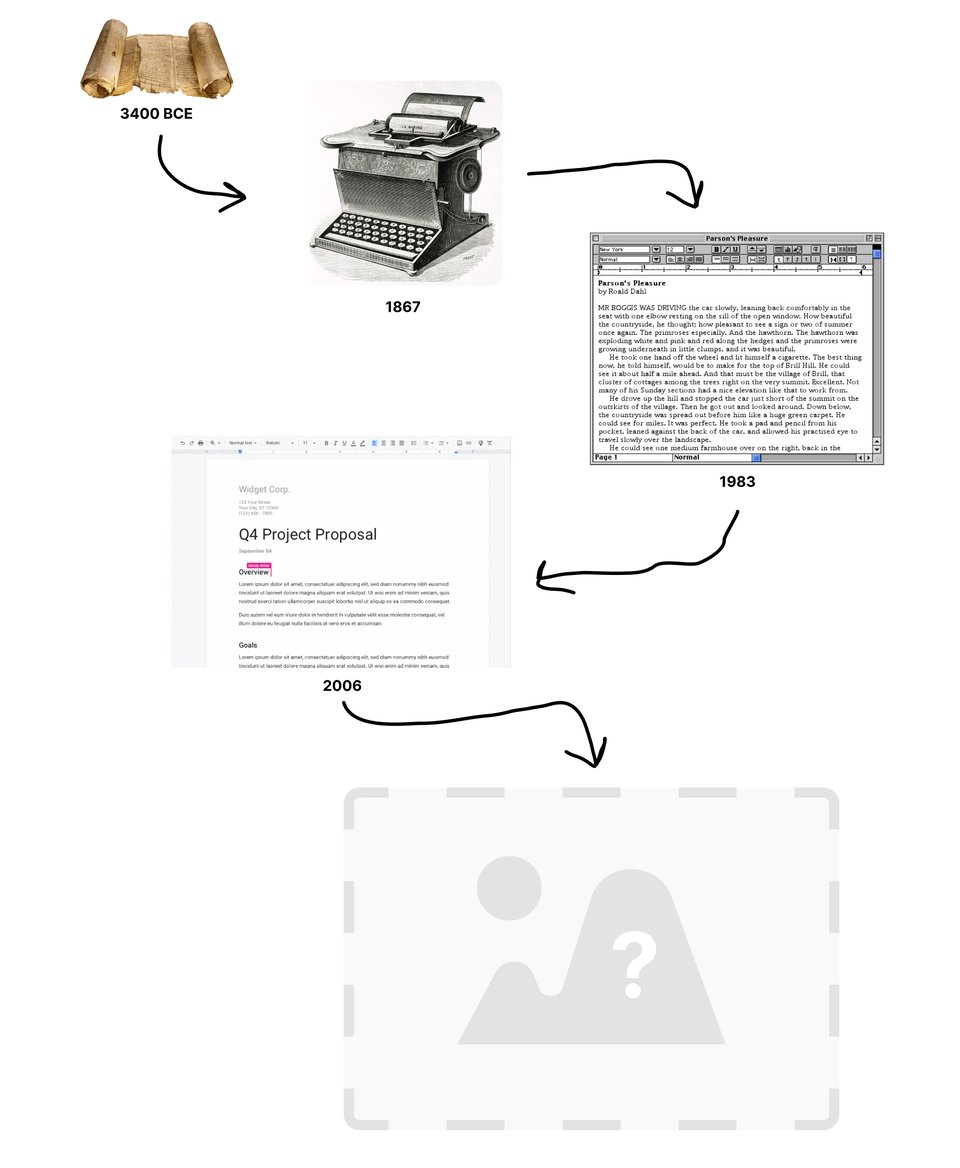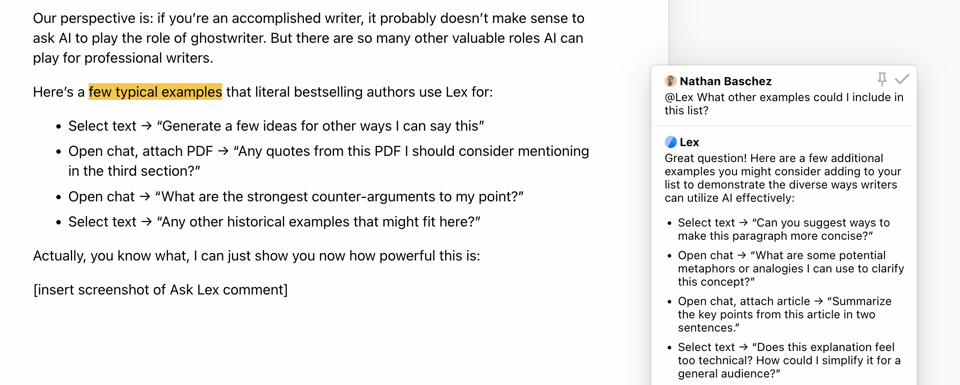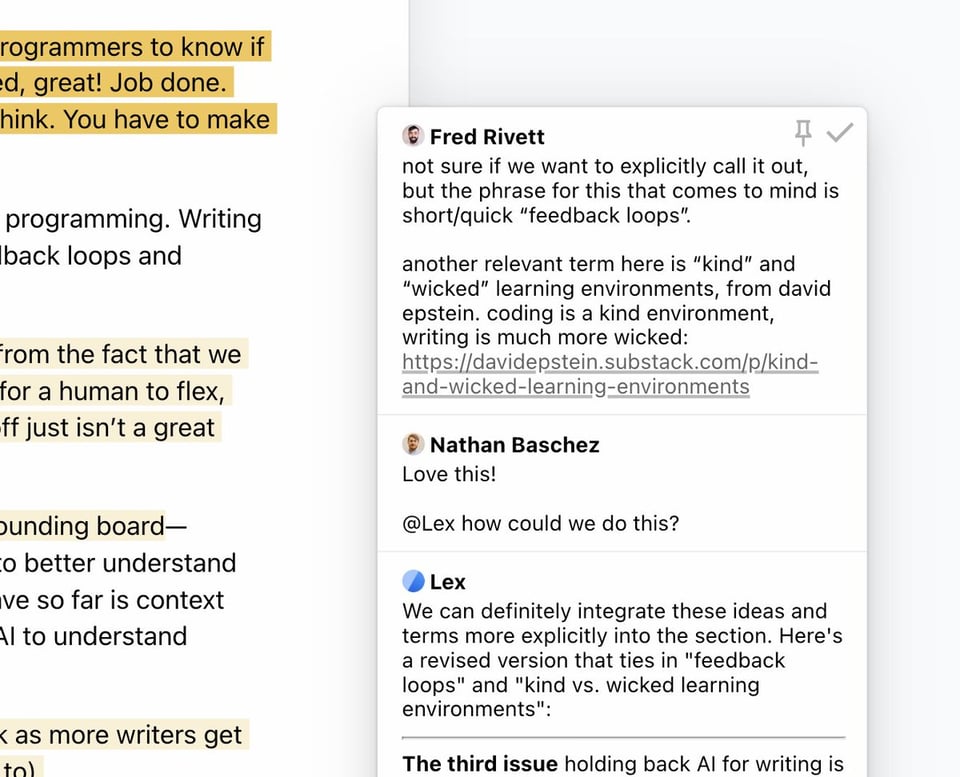Lex Annual Letter: Why don’t more writers use AI?
Hi! Nathan here, founder of Lex.
This week, a new tradition: an annual letter from me to you.
By all measures, 2024 was an incredible year for Lex. We shipped some foundational improvements to the writing experience, and it paid off:
47 thousand of you made 15 million edits in 400 thousand documents.
You exchanged 3 million messages with AI, and accepted 2.2 million inline suggestions with our Checks feature. (Fun fact: you deleted 1.8 million words using Brevity Check!)
In total, you used more than 14 trillion LLM tokens, input and output.
But still, it’s important to ask, “How’s it really going?”
Here’s my honest take:
Lex is only ~0.01% of the way towards our mission: to build the obvious word processor of choice for writers worldwide, by pioneering the AI era of writing.

We’re off to a good start. In fact, Lex is probably leading among AI-native, general-purpose word processors. But compared to our ambition, we’re still at the base of the mountain.
Most writers still use the same tools and workflow as ten years ago. They don’t use AI in their writing beyond basic grammar checks and sporadic quick questions to ChatGPT. It’s like having a polymath genius sat next to you all day ready to help, and only asking a few basic questions.
If you want to see a creative field that’s further along the AI adoption curve, look no further than programming. Every programmer I know uses AI all day. In 2024, tools like Cursor and GitHub Copilot reached millions of developers, and Google has said fully 25% of the code their engineers commit is now AI-generated. I couldn’t find similar stats for writing (which itself may be an indicator), but we talk to writers all the time and it’s obvious that AI for writing has nowhere near the depth and breadth of adoption as AI for coding.
As a writer/programmer who is building an AI writing tool, I naturally think about this gap in adoption a lot. Our team has developed theories about why the gap exists and how Lex can close it in 2025 and beyond.
The reasons fall into two main categories: conceptual hangups and practical frictions.
Let’s start by addressing the conceptual hangups. I think they account for maybe 20–30% of the gap, but they loom large culturally.
[Side note: We’re doing a live session next week where we show how we used Lex to help write this essay, and answer all your questions. If you’re interested in joining, click here for more info.]
A lot of writers don’t know how—or even if—they should use AI. Offices and schools have banned it, and many writers who use AI have a vague sense of shame and are reluctant to speak about it. To some, it feels like a deceptive and/or weak move.
There’s merit to these concerns. It’s wrong for students or job applicants to try to pass off AI-generated writing as their own. And if you rely on AI in the wrong way, it will weaken your writing skills, which generally weakens your ability to think clearly.
But, from personal experience, I know there are many ways to use AI for writing that are not only ethical, but actually strengthen your ability to write and think. Programmers understand this.
So how can we reconcile these seemingly conflicting ideas?
Through one simple metaphor: using AI is like hiring someone.
You can hire AI to play many different roles:
It is almost always OK to hire a trainer, coach, editor, brainstorming partner, research assistant, early reader, proofreader, etc. It makes you a stronger writer and helps you think more clearly.
Hiring a ghostwriter or co-writer is OK sometimes, but not always. It can free you to focus on other things, but in the end, writing is thinking. You don’t want to play too passive a role. The best ghostwriters are deep collaborators that demand significant time and effort from their clients.
I hope this understanding becomes more widespread in 2025 and fewer writers have conceptual hangups about using AI in their process.
But still, there are practical friction points that make AI harder to use for writing than it is for programming. I think they account for 70-80% of the gap in adoption. (Narratives are usually driven by practical reality, more so than the other way around.)
Here are the main three difficulties, along with our thoughts on how new tools can overcome them.
The first issue is that writers are rightly more sensitive to prose style than programmers are about code style. Programmers are happy to constantly paste chunks of AI-generated code into their files; writers can’t do this as easily. And the more experienced a writer you are, the less happy you’ll be with the results of AI-generated writing. The more you know what you sound like, the harder it is to get AI to sound like you, and the less reason you have to try.
Our perspective is: if you’re an accomplished writer, it probably doesn’t make sense to ask AI to play the role of ghostwriter. But there are so many other valuable roles AI can play for professional writers.
Here are a few typical examples of tasks that pros (including bestselling authors, professors, journalists, and more) use Lex for:
Select text → “Generate a few ideas for other ways I can say this”
Open chat, attach PDF → “Any quotes from this PDF I should consider mentioning in the third section?”
Open chat → “What are the strongest counter-arguments to my point?”
Select text → “Any other historical examples that might fit here?”
Actually, you know what, I can just show you now how powerful this is:

I do this kind of thing all the time!
But I also think a lot of writers, especially newer writers, find the blank page extremely intimidating. Using AI to spin up a first draft that sounds close to your voice can jump start your process (even if you end up scrapping 99% of it). And, once you train AI to understand what you want, the editing and feedback it provides can be genuinely insightful.
Generic AI isn’t great at either of these roles, but we’re working to make the training process really easy. More on this coming soon, but for a hint, check out our Kit integration.
The second issue is about context and background info. If you want AI to be useful, in both writing and programming, you often need to give it background info by attaching files or pasting extra context.
For programmers, this is easy. They already have most of the background information the AI needs handy in one centralized place: their codebase. But writers often rely on notes, PDFs, books, and other inputs that are often not centrally located.
That’s why we think it’s so important to have your AI deeply integrated with your documents, notes, and research, like it is in Lex.
Today, most writers who use AI spend a lot of time pasting or uploading files to ChatGPT, but there’s a lot of friction and creativity required, so adoption is limited. In the long run, I think writers will use integrated systems that feel more like a programmer’s IDE (“integrated development environment,” e.g. Cursor).
One example of this today in Lex is our context tags feature, which makes it easy to create buckets of reusable background info that you can add to AI chats any time you want. When you create a context tag, you can attach files, URLs, Lex documents and folders, and, soon, other context tags! (That’s right programmers, context tags will soon be “composable”).
This requires a bit of up-front work. So, we’ve made context tags shareable across teams so one person can play the role of “AI librarian,” and we hope to automate as much of this work as possible over time.
We think this and other ideas will be big steps towards smoothing the friction that makes it hard to give AI the right context.
The third issue holding back AI for writing is that it’s easier for programmers to know if AI’s suggestions are good. If the code runs and works as expected, great! Job done. Whereas when you’re writing, you never know what readers will think. You have to make a judgment call.
(This is why I think writing is in many ways harder than programming. Writing is a “wicked” learning environment, with slow, lossy feedback loops and changing rules. Programming is much more “kind.”)
Our stance? We aren’t looking to replace a writer’s judgment with AI. To do so would undercut one of the main reasons anyone reads anything: we want to know what other people think! We are, above all, interested in other people. Writers can use tools to help them create things, but in the end, they must take responsibility for the finished product. AI can generate options and ideas, but the decision is on us.
Of course, that doesn’t mean AI has no role to play in the writing process. Personally, I feel much better about hitting “publish” when I’ve spent a lot of time with AI working on a draft. It’s like sending a draft to a colleague or friend, but I can do it constantly.
By the way, I still send drafts to colleagues and friends! Human feedback is irreplaceable. We’ve put a lot of effort into making Lex great for collaboration, with more coming soon.
Also, sometimes, colleagues and AI can collaborate in the same space!

But no matter how many times you ask AI (or humans) to give you feedback, you can never be sure about what will happen until you publish. That’s the immutable truth about writing—terrible and wonderful as it is.
If you want help with that, I’d recommend reading Big Magic by Elizabeth Gilbert and Bird by Bird by Anne Lamott. Then maybe chat with AI about it :)
The thing I most look forward to in 2025 and beyond is how the culture and technology of writing (and, let’s not forget, reading) co-evolve. Maybe the writers of today who are foolish enough to futz around with AI will discover something that writers of tomorrow will consider obvious. As for us here at Lex, we’re just thrilled to have the opportunity to play our part in this dance.
On that note, I thought it might be fun to close out with some stories of writers who are using Lex today to do amazing things. Maybe it sparks something for you.
If you’d like, feel free to reach out to us at hello@lex.page. We’d love to hear from you.
Happy New Year!
—Nathan Baschez, Founder & CEO of Lex
[Reminder: We’re doing a live session next week where we show how we used Lex to write this essay, and answer all your questions. If you’re interested in joining, click here for more info.]
Nate B Jones
TikTok creator focused on AI
Lex has been super helpful in helping me think through complex ideas and get past the blank page in blog post creation. I use the context tags feature plus extended chats in the sidebar to brainstorm ideas, then I cycle text in to drafts, edit, chat, and go back and forth until I have a post in the shape I like. Using Lex makes the whole thing feel smooth—feels like a step toward a post-blank page future!
Diana Stepner
Product Leadership Coach
I'm one of those writers who revises, revises, and then revises some more. I used to do that on my own. Sometimes even my own head gets stuck on repeat. Now I use Lex as a brainstorming partner. I've created my own prompts that are me and reflect my style. Lex catches things I've overlooked and challenges me to think more deeply. By partnering with Lex, my writing has become stronger - not just in grammar and structure - but in how I form and convey my thoughts. No more revise, revise, revise. Instead it's write, write, and write some more.
Jeremy Caplan
Author of Wonder Tools
Lex has helped streamline the copy editing workflow for my Wonder Tools newsletter. I appreciate the checks focused on grammar, brevity, cliches, readability, passive voice, hedging (confidence), and repetition. I like having a smart assistant to protect me from silly errors and weak sentences.
Michelle LaRose
Host, Feel Good Sales Podcast
I maintain a spreadsheet that I provide as a freebie to track business connections and follow-ups, and I've always wanted to enhance its functionality. When I asked Lex for suggestions, it proposed a super cool feature: automatically generating follow-up dates based on the type of connection. Lex went above and beyond by providing not just the idea, but also the exact Google Sheets formula I needed. I implemented it immediately, and now my follow-up system is more valuable than ever!
Ben Williams
The Product-Led Geek
One of my biggest wins has been using Lex's custom checks feature to maintain consistency in my writing style across newsletters. I've created specific prompts that help ensure my unique voice comes through while keeping the quality high. The ability to reference my own writing samples in these checks has been particularly valuable - it helps the AI understand and preserve my authentic style.
Tony Wan
Head of Platform at Reach Capital
I’ve grown to use Lex more and more this year, for emails and memos to family updates, full-length articles and book reviews. The built-in mechanics checks are super handy for improving communication clarity, and the AI feedback has helped me get out of those inevitable creative ruts.
While I don’t always agree with its comments, it pushes my thinking in the right direction — just as any good human editor would do. Most importantly, the end product still feels like my work (which I cannot say for many other AI writing tools).
Raquel Devillé
Therapist
After years away from writing, Lex helped me rediscover my creative voice. I use it daily for structuring texts and developing new ideas, making the writing process feel natural and enjoyable again. The AI-powered assistance has become an invaluable part of my workflow, helping me refine and polish my thoughts.
Thanks to Lex, I'm not just writing again—I'm launching a completely revitalized blog in early 2025. What started as a tool for occasional writing has become the cornerstone of my creative renaissance. Whether I'm brainstorming new concepts or fine-tuning existing work, Lex has made the difference between thinking about writing and actually doing it.
Craig Van Slyke
AI Goes to College + Chair in Information Systems at Louisiana Tech
Lex has become an integral part of my workflow for AI Goes to College. Two things stand out. First, it's great to have the checks and general prompt-based feedback available right in Lex, rather than having to copy and paste into Claude or ChatGPT. That's awesome, but it's not the real power of Lex. Lex is like the friend who will tell you the truth about your writing (in a kind way). As I tell people, Lex isn't a people-pleaser, it will tell you what can be improved with your writing. Thanks to Lex, my articles are tighter and more focused on delivering valuable information to AIGTC readers.
Dan Brazil
Enterprise Account Executive at Glassbox
Lex has revolutionized my prospecting sales process by enabling me to create targeted content and emails for various personas using its powerful context tags, acting like mini LLMs and easily consolidating all my information.
Lex's ability to generate emails, directly link to my 'Intelligence Libraries', refine my prompts, and retrieve specific company information is a huge time saver, making me feel like I'm working with a super advanced AI.
Lex is far superior to other tools I've tried, particularly custom GPTs, because it allows me to manage content, edit documents, and share information seamlessly, making it an indispensable tool for sales and research.
Terri Lonier, PhD
Founder of Solo Business School
After running my weekly SOLO newsletter issue through Lex checks (Brevity is always helpful!), I ask Lex to draft two more items. First is a teaser sentence or two that appears in my readers’ inbox preview, designed to entice them to open and read the newsletter. The other is a meta description highlighting SEO keywords to drive traffic to the post. Both are limited to 130-150 characters. Lex streamlines the final writing process and helps me get the newsletter out the door.
Terri Lonier publishes SOLO, a newsletter on visual communication that helps solopreneurs stand out. Subscribe at: https://terrilonier.com/newsletter
Tyler Schwartz
Children’s Writer
I'm Tyler Schwartz, and I created Story Time Chess—a collection of 8 nursery rhymes in a board game that teaches chess to 3-year-olds. After we won People's Choice Toy of the Year and made Time Magazine's invention of the year list, I started looking for ways to write more stories faster. That's when I found Lex, and it completely changed how I write my stories.
Here's what I did: I started by creating two style guides with Lex—one for my brand, Learn Through Stories, and another specifically for my new project, a 4-chapter series called "The Garden of Growing Hearts." Once I have my outline ready, I use Lex's context tags to keep my writing on-brand and consistent with my style. It's like having a writing partner who knows exactly what I'm going for.
The best part? I'm now writing stories faster than ever, and they sound more authentically "me" with each new piece. I keep updating my style guides based on what works best, which helps Lex understand my voice better and better.
I'd love to share these stories with you! Join my free Learn Through Stories Substack, where I'll be posting a new story every week. It's a no-brainer way to bring more engaging, educational stories into your children's lives.
